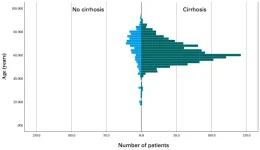(Press-News.org) More is not always better when it comes to hospital care. The same interventions that could save one patient’s life could lead to no benefit, higher hospital bills and even injury for another.
A University of Michigan led study published in the journal Intensive Care Medicine interviewed almost 90 clinicians and hospital staff and performed onsite observations across eight unaffiliated hospitals in Michigan to understand why different hospitals used the intensive care unit more than others.
“You would think it should be obvious which patients need ICU care—the ‘sickest’ patients. But we found that whether a patient needs ICU care really depends on which hospital they’re at,” said Thomas Valley, M.D., assistant professor in the Division of Pulmonary and Critical Care Medicine and lead author to the study. “Some hospitals had no problems caring for complex patients in non-ICU areas, like general wards. These patients weren’t felt to get much additional benefit from being in an ICU. On the other hand, patients in hospitals without a lot of experience caring for sick patients spent a lot of time and resources focused on making sure these patients who were sick received ICU care.”
The authors found several factors that influenced whether a patient would receive ICU care. The first was availability of ICU beds, with critically ill patients often kept in the emergency department when ICU beds were full.
The second was staff characteristics, such as their comfort with taking care of sicker patients or whether an ICU nurse was available. In particular, the authors found that some ICUs frequently had to close off their ICU beds because they didn’t have sufficient ICU nurses to operate them.
The third factor was the hospital’s place within the existing networks of interhospital transfers. For example, smaller hospitals often expedited interhospital transfers in order to avoid delays that might pop up later during the hospitalization, such as if bad weather were to occur.
Finally, hospital policies related to ICU admission dictated some decisions to put patients in the ICU—with some care providers basing the decision on misunderstood or non-existent policies around who qualifies for care.
And while medical guidelines dictate that decisions around ICU admission be driven by how likely it is that a patient will benefit from ICU care, in everyday practice, trying to figure that out is almost impossible, state the investigators.
Instead, the authors believe that we may need to move away from universal guidelines so that individual hospitals can develop their own strategies to ensure their sickest patients always receive ICU care.
Additional authors: Amanda Schutz, Jacquelyn Miller, Lewis Miles, Kyra Lipman, Tammy L. Eaton, Colin R. Cooke, all with University of Michigan; Harish Kinni, Henry Ford Hospital; and Theodore J. Iwashyna, Johns Hopkins University
Paper cited: “Hospital factors that influence ICU admission decision‑making: a qualitative study of eight hospitals,” Intensive Care Medicine. DOI: 10.1007/s00134-023-07031-w
END
Who goes to the ICU and why?
Some hospitals use intensive care 20 times more than others. Researchers wanted to understand why
2023-04-18
ELSE PRESS RELEASES FROM THIS DATE:
New self-powered ultraviolet photodetector
2023-04-18
Ultraviolet (UV) light detection can revolutionize industries such as civil engineering, military defense, aerospace exploration, and medical research. The future of electronics relies heavily on energy-efficient devices that can function independently, which makes the development of photoelectric UV detectors critical. These detectors come in two main types: photoconductive and photovoltaic, each with unique advantages and applications.
Photoconductive detectors rely on the changes in the conductivity ...
People with severe obesity and a genetic pathway variant have increased risk of hypertension, Mayo Clinic research finds
2023-04-18
ROCHESTER, Minn. — Obesity and its associated cardiometabolic issues are a major health concern in the U.S. and internationally. According to a study published in 2017, 12% of the world's adult population was affected by obesity in 2016, double the percentage from 30 years earlier.
With obesity comes an increasing risk of cardiovascular disease, including stroke, congestive heart failure and myocardial infarction. Fortunately, obesity is a multifactorial disease that results from an energy balance dysregulation and often is a modifiable risk factor for cardiovascular disease.
"Body ...
Physicists find unusual waves in nickel-based magnet
2023-04-18
HOUSTON – (April 18, 2023) – Perturbing electron spins in a magnet usually results in excitations called “spin waves” that ripple through the magnet like waves on a pond that’s been struck by a pebble. In a new study, Rice University physicists and their collaborators have discovered dramatically different excitations called “spin excitons” that can also “ripple” through a nickel-based magnet as a coherent wave.
In a study published in Nature Communications, ...
Sex after menopause doesn’t need to hurt
2023-04-18
Between 13% and 84% of postmenopausal women experience vaginal pain during sex
Causes of pain other than vaginal dryness are often undiagnosed and untreated
Pain during sex can harm relationships, self-esteem and contribute to depression, anxiety
Safe, effective therapies exist but condition is rarely evaluated or treated
CHICAGO --- Between 13% and 84% of postmenopausal women experience dyspareunia—vaginal pain during sex—but the condition is rarely evaluated or treated despite the availability of safe and effective therapies. With life expectancy increasing and the functional health of older adults improving, ...
Public lecture: My career in five equations, and the importance of mathematics education in the digital age
2023-04-18
Professor Stephen Garrett to discuss why the UK needs to up its game in maths education
He has a particular interest in the development of mathematical and computational solutions to real-world problems
Lecture will take place on Thursday 27 April at Aston University.
18 April 2023 | Birmingham, UK
The latest inaugural lecture at Aston University is to explore why the UK’s low level of mathematical skills don’t add up to a positive digital future.
Professor Stephen Garrett will discuss why school-level mathematics is so important in many areas of life and will discuss how ...
Mouse study hints at specific brain receptor behind PCOS symptoms
2023-04-18
Polycystic ovarian syndrome, or PCOS, can cause a range of symptoms, including disrupted menstrual cycles, abdominal obesity, cardiovascular disease, and type 2 diabetes. It’s also one of the biggest causes of infertility — in fact, many people don’t discover they have the condition until they try to become pregnant.
One of the hallmarks of PCOS are elevated levels of hormones produced by the ovaries called androgens. Androgens play important roles in puberty and reproduction in people with ovaries and people with testes.
Researchers are trying to understand why PCOS develops and how androgens lead to negative symptoms. A recent study led by Alexandra ...
Epic sepsis model’s ability to predict depends on hospital factors
2023-04-18
In the fight against sepsis, one of the leading causes of death in hospitalized patients, clinicians are increasingly reliant on prediction tools trained on massive amounts of data stored in electronic health records. One of the most popular tools comes from Epic Systems and is used in more than half of United States hospitals. However, research has shown that its performance varies depending on the hospital in which it’s being used.
In a recent research letter published in JAMA Internal Medicine, researchers from U-M, Oregon Health and Sciences University, and Washington University looked for a possible explanation for this variation. Using more than 800,000 ...
Could fixing a problem with the heart be good for your brain?
2023-04-18
EMBARGOED FOR RELEASE UNTIL 4 P.M. ET, TUESDAY, APRIL 18, 2023
MINNEAPOLIS – People who have an irregular heartbeat called atrial fibrillation that is treated with a procedure called catheter ablation may have a reduced risk of dementia compared to those who are treated with medication alone. The preliminary study released April 18, 2023, will be presented at the American Academy of Neurology’s 75th Annual Meeting being held in person in Boston and live online from April 22-27, 2023.
Catheter ablation uses radiofrequency through a tube into the heart to destroy small areas of heart tissue that may be causing the abnormal heartbeat.
“Previous studies have ...
CA 19-9 and CEA in prognosis of duodenal adenocarcinoma: A retrospective study
2023-04-18
“To our knowledge, there are no studies evaluating the prognostic importance of CEA and Ca 19-9 in patients with DA [duodenal adenocarcinoma].”
BUFFALO, NY- April 18, 2023 – A new research paper was published in Oncotarget's Volume 14 on April 15, 2023, entitled, “Importance of carbohydrate antigen (CA 19-9) and carcinoembrionic antigen (CEA) in the prognosis of patients with duodenal adenocarcinoma: a retrospective single-institution cohort study.”
Duodenal adenocarcinoma (DA) is a rare ...
UMD psychologist finds daily occurrences’ impact on suicide, self-harm ideation in LGBTQ+ teens
2023-04-18
Since the start of 2023, a record number of anti-LGBTQ+ bills have been introduced into state legislatures. According to University of Maryland Associate Professor Ethan Mereish, such current events add to the list of daily thoughts and experiences that lead LGBTQ+ teens to report having suicidal and non-suicidal self-harm thoughts.
Mereish recently led a first-of-its-kind study, published in the Journal of Psychopathology and Clinical Science, that asked 12-19 year-old LGBTQ+ teens to fill out a brief “daily dairy” survey for 28 days. The teens were asked to identify the unique kinds of stress they experience as a member of the LGBTQ+ community, ...
LAST 30 PRESS RELEASES:
Exploring the link between hearing loss and cognitive decline
Machine learning tool can predict serious transplant complications months earlier
Prevalence of over-the-counter and prescription medication use in the US
US child mental health care need, unmet needs, and difficulty accessing services
Incidental rotator cuff abnormalities on magnetic resonance imaging
Sensing local fibers in pancreatic tumors, cancer cells ‘choose’ to either grow or tolerate treatment
Barriers to mental health care leave many children behind, new data cautions
Cancer and inflammation: immunologic interplay, translational advances, and clinical strategies
Bioactive polyphenolic compounds and in vitro anti-degenerative property-based pharmacological propensities of some promising germplasms of Amaranthus hypochondriacus L.
AI-powered companionship: PolyU interfaculty scholar harnesses music and empathetic speech in robots to combat loneliness
Antarctica sits above Earth’s strongest “gravity hole.” Now we know how it got that way
Haircare products made with botanicals protects strands, adds shine
Enhanced pulmonary nodule detection and classification using artificial intelligence on LIDC-IDRI data
Using NBA, study finds that pay differences among top performers can erode cooperation
Korea University, Stanford University, and IESGA launch Water Sustainability Index to combat ESG greenwashing
Molecular glue discovery: large scale instead of lucky strike
Insulin resistance predictor highlights cancer connection
Explaining next-generation solar cells
Slippery ions create a smoother path to blue energy
Magnetic resonance imaging opens the door to better treatments for underdiagnosed atypical Parkinsonisms
National poll finds gaps in community preparedness for teen cardiac emergencies
One strategy to block both drug-resistant bacteria and influenza: new broad-spectrum infection prevention approach validated
Survey: 3 in 4 skip physical therapy homework, stunting progress
College students who spend hours on social media are more likely to be lonely – national US study
Evidence behind intermittent fasting for weight loss fails to match hype
How AI tools like DeepSeek are transforming emotional and mental health care of Chinese youth
Study finds link between sugary drinks and anxiety in young people
Scientists show how to predict world’s deadly scorpion hotspots
ASU researchers to lead AAAS panel on water insecurity in the United States
ASU professor Anne Stone to present at AAAS Conference in Phoenix on ancient origins of modern disease
[Press-News.org] Who goes to the ICU and why?Some hospitals use intensive care 20 times more than others. Researchers wanted to understand why



